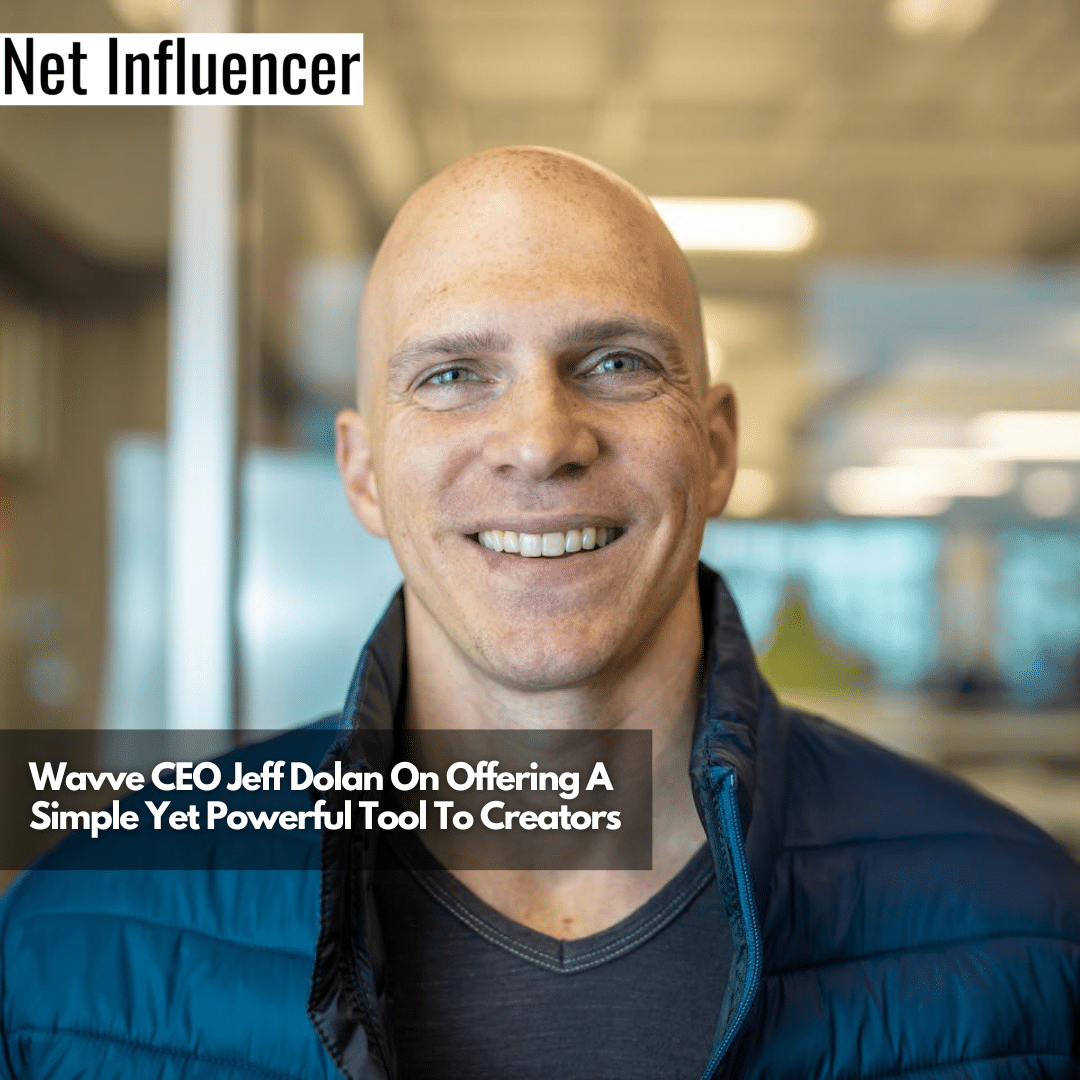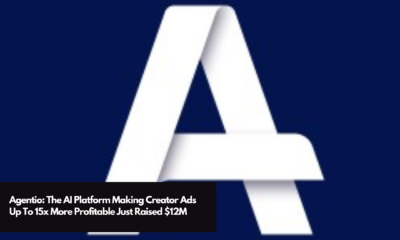Technology
Wavve CEO Jeff Dolan On Offering A Simple Yet Powerful Tool To Creators
Find out how a simple tool like Wavve helps creators and musicians improve their reach and engagement with their audiences. In this interview, we’ll get to know Jeff Dolan, the CEO of Wavve, and how this platform is different from its competitors and continues to help all types of creators.
Find out how a simple tool like Wavve helps audio creators and podcasters improve their reach and engagement with their audiences. In this interview, we’ll get to know Jeff Dolan, the CEO of Wavve, and how this platform is different from its competitors and continues to help all types of creators.
Who is Jeff Dolan?
Jeff Dolan is the CEO of Wavve, a platform that creates podcasts, talks, or audiobooks into easy-to-consume video clips for social media. Wavve has been around for about five to six years and started with the goal of helping audio creators and podcasters share their audio on social media to grow their audience and influence.
Wavve took off during COVID when everybody stayed home and figured out they wanted to try out podcasting. “We had a lot of great users and creators on the platform, and it skews more towards beginners and folks who don’t have a huge team of content creators,” Jeff adds.

Jeff has always been a podcaster, creator, filmmaker, and musician, so joining Wavve was the right fit. Through Wavve, a creator like him can help other creators.
What inspired you to enter the creator economy market?
Most of Jeff’s career was spent in medical software sales and business development, and he is always on the lookout for a creative outlet. He’d spend his leisure time playing music and filmmaking.
From 2019 to 2020, Jeff got out of the corporate world and dove into more entrepreneurial pursuits. This was when he got the opportunity to work at Wavve. The merging of his extracurricular activities and day job started as a strange experience for Jeff, and now he can’t imagine working any other way.
“As a first-time CEO, it’s been eye-opening to take the reins of a company like Wavve and help creators in this way,” Jeff shares.
Can you explain how Wavve helps content creators in the creator economy?
One of the things that Wavve does is it takes podcasts and audio files and puts them on social media in an engaging way. This solves a common problem most audio creators face.
“Let’s say you’re a podcaster, and you wanted to post a clip on Instagram. You can’t just go into the Instagram app and post your audio file. It needs video, with interesting visuals that match your audio. Something to stop the scroll,” Jeff explains.
Some musicians put a blank or static image on social media and then add their music. This strategy doesn’t work as it’s not engaging at all. On silent mode, people scroll right on by with nothing to alert them the audio is important.

When people scroll on social media, most of the audio is off. This means the visual becomes the part that entices them to click to listen.
Wavve produces an organic waveform animation that catches the eye as people scroll. Creators can also add text, captions, and a nice image. If creators have a nice headshot, podcast cover, book cover, or album cover, they can add it to their posts.
Wavve also solves the problem of editing. Video takes a lot to produce because it requires editing. With Wavve, creators don’t need to edit anything. They can turn their audio into video easily with a few clicks.
Wavve compliments any creator’s overall content strategy because it’s not trying to do everything. “We understand that there are a lot of trends happening right now with vertical face-on-screen TikTok style videos. We’re not trying to compete there because our creators don’t want to be on screen all the time,” Jeff explains.
Instead, Wavve makes it easier for creators who have a very small team to get podcast content on social media platforms. In fact, a lot of solo podcasters are using Wavve.
Can you walk us through the process of creating a Wavve video from an audio file?
There are three steps involved in creating a Wavve video from an audio file. First, creators just need to provide a link to their RSS feed or the title of their podcast, as Wavve will find the link. Once Wavve has the audio, it’ll grab, download, and then process it.
Next, creators can add a photo by uploading it to Wavve. Or we can grab their podcast cover automatically. The final step will require the creator to specify which part of the audio they want to convert into a video. For instance, they say they only want a 30-second clip from the audio or to focus on a specific timestamp. Wavve will generate and animate the video based on the specifications made by the creator.
After a minute or two, creators can have their video, which they can download to any device. Wavve will send an email with the video generated, and creators can now upload it to any social media platform.
How do you ensure the quality of the video clips created by Wavve?
Wavve has a pretty high standard as far as audio and video quality are concerned. The quality of content Wavve generates depends on the quality of audio the creators upload.
It’s common for new creators to get frustrated with image resolution or video dimension sizes. For example, they will upload a small thumbnail and want a large, high-resolution video. And Wavve has a live support team to help there. But for creators who upload high-quality images, Wavve will generate videos with that same quality.
What are some of the benefits of using Wavve for promoting content on social media?
The benefits of using Wavve are: it’s simple, it’s fast, and it captures the audience’s awareness. In other words, Wavve is trying to give creators more chances to introduce new audiences to their work through social media.
Podcasters can’t simply say, “Hey, I recorded this hour-long podcast. Here’s the link — go and listen to it.” No one is going to click that link and listen to that podcast, especially if the podcaster is new or covers a topic that’s uninteresting to the audience. No one wants to spend an hour of their time finding out whether they like the podcaster or the topic they cover.
Wavve is basically a platform that produces content that works the same way as movie trailers. “We’re helping you create those little trailers and those little on-ramps,” Jeff adds. With these trailers, the audience can see topics, captions, or titles that are intriguing to them, and they’ll likely visit the podcast and listen to it.
Onboarding new audiences through Wavve takes consistency, but the platform guarantees to help creators in the simplest and easiest way possible. With Wavve, creators don’t need a full studio, investment in cameras, time editing, or payment for a huge content team.
How does Wavve help musicians promote their work on social media?
Wavve helps musicians using the same concept. In fact, Wavve has had musicians who mastered their craft but don’t want to deal with their social media marketing. For them, social media marketing is one of those necessary evils that they have to manage.
For musicians, the idea of learning how to edit videos on top of learning how to make music is daunting. Fortunately, Wavve is available to help musicians get their audio files into visual content and post it on social media the same way they would load their music.
If musicians want to do a lyric video or something of that sort, they could with Wavve. But oftentimes, artists will just put their album cover with a nice animation, followed by their music.
How does Wavve differentiate itself from other similar products in the market?
The number one thing that makes Wavve different is its simplicity. “The challenge for a lot of software companies or any kind of company that gets into a niche is this concept that once you learn something, it’s easy to think everyone else knows it,” Jeff continues.

When companies explain their products or services to users, they’ll do it at a level as if users already know it. Companies might be at a level 8 or 10 in terms of expertise about their offerings and will explain them to users as if they’re at a level 5. But that doesn’t guarantee positive results — companies must consider users as if they’re at level 1 or 0.
Simplicity is crucial in today’s ever-complex world because people don’t know what they don’t know, and for them to learn a new piece of software is overwhelming.
Jeff also takes pride in the quality of support that Wavve provides. Listening is a big part of what they do, and they exhaust resources to understand what their customers need and want. “We are there for them with real people. We have live support people helping our creators,” Jeff adds.
What are some of the most successful Wavve use cases you have seen from creators?
Wavve has an exclusive newsletter for Wavve creators and highlights a Wavve Design of the Week. Ever since the newsletter came out last year, the video designs highlighted are getting better and better. Jeff and his team are seeing more engaging and better-designed audiograms.
Wavve even has some advanced users who are posting to seven to ten social media platforms using the same Wavve video or audiogram. They also had some interesting use cases, like one customer who needed a quick way to get an audio recording of his eulogy for his mom, who recently passed away. This customer needed a video to give to the funeral home for them to play. He used Wavve to turn his phone audio into a nice video.
How do you plan to evolve Wavve to meet the changing needs of the creator economy?
In light of AI and the generative AI happening in the creator economy, Jeff believes that Wavve could go in many different directions. But they want to focus on one of their values, which is keeping it simple. The question now is how they will keep Wavve simple while making it unique and not just a “me-too” type of product.
Because of the popularity of ChatGPT and its API, any company can just use the API and claim that they can do what ChatGPT can do. But in reality, that company is using the same functionality that’s available anywhere, and everyone has access to it.
The question isn’t really about whether companies should add AI to their products — it’s about how they are going to apply such technology to help specific customers. When looking at the situation from Wavve’s perspective, it’s about looking for ways to use AI to help podcasters who need to quickly generate content from their audio.
In the future, Wavve will look for ways to help creators design different variations of their content, get better captioning, and just make their existing processes easier.
Can you talk about any new features or updates that are currently in development for Wavve?
Wavve recently rolled out a transcription feature, which is getting better every day. In fact, in a recent test, it showed better accuracy than Amazon and Google.
Although it’s not announced or available on their website yet, they’ve announced it internally that creators using a paid Wavve plan can enjoy unlimited transcription.
How do you measure the success of Wavve, both in terms of user engagement and revenue?
Wavve looks into the number of people using the platform on a month-to-month basis and assesses if that number is going up or down. As far as revenue, they’ll look into the number of new creators signing up and using their solution.
Wavve has a freemium model where thousands of people sign up to use Wavve’s Free Plan. Every month, they’ll check how many of those individuals will turn into paid customers. This number signifies that people want to go deeper, have longer videos, and enjoy more features from Wavve.
What advice would you give to aspiring creators looking to promote their content on social media using Wavve?
“Pace yourself, have a sustainable plan to create content for the long-term, and look at yourself as a publisher first,” Jeff says. Creators who want to make content for an online audience have to remember that it’s about their personality, opinions, and staying power.
It’s also important to choose tools and processes that are simple and easy to use. Creators shouldn’t invest in anything that’s overly complex for them. If it’s too hard to use, the likelihood of quitting is high. Choose the right tools and processes that can be used for years on end without getting tired or burned out.



![The Rise Of News Influencers 1 In 5 Americans Get Their News From Social Media Creators [REPORT]](https://www.netinfluencer.com/wp-content/uploads/2024/11/The-Rise-Of-News-Influencers-1-In-5-Americans-Get-Their-News-From-Social-Media-Creators-REPORT-1-400x240.png)
![The Rise Of News Influencers 1 In 5 Americans Get Their News From Social Media Creators [REPORT]](https://www.netinfluencer.com/wp-content/uploads/2024/11/The-Rise-Of-News-Influencers-1-In-5-Americans-Get-Their-News-From-Social-Media-Creators-REPORT-1-100x100.png)
















